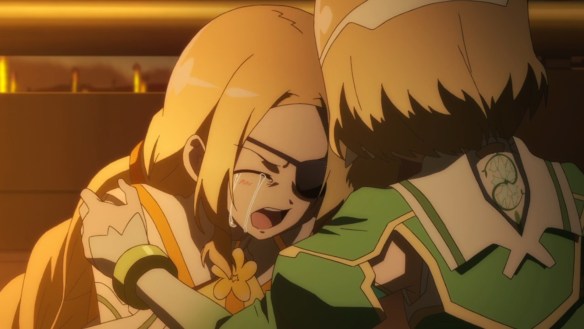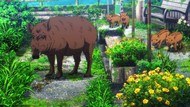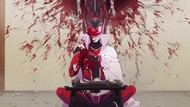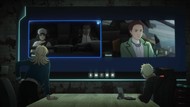Hello folks, and welcome back to Wrong Every Time. Today we’ll be returning to an adventure that I’m frankly not sure I even want to continue, as we check back in on the beleaguered magical girls of Yuki Yuna is a Hero. Not because the show has gotten less interesting or anything; with the Taisha’s true nature revealed, the show’s reflections on genre convention and fundamental character drama have never been stronger. But all of that strength is now being put to work torturing our young hero club, and I simply will not have it! Leave our heroes alone, you stupid evil tree!
Anyway, personal feelings aside, we are now well and fully past the point of ignorance regarding this system’s true intent. The vertexes are essentially bait for hopeful young heroes; expending their energy to protect their homes, they are converted into food for their ever-ravenous homeland. Rather than saving this world for the next generation, magical girls are consumed to maintain a static order, venerated as martyrs for a cause they would never willingly have supported. It’s a sturdy metaphor for an increasingly aging Japan, wherein blind patriotism and a renewed fervor for militarization are apparently supposed to make up for a lack of genuine opportunities. What can our young handful of heroes do in the face of such structural malevolence? Let’s find out!
Episode 10
We open right where we last left off, with Fu still bawling in Itsuki’s arms. Delightful!
Suddenly their phone alarms go off. While the main group reacts in surprise, we jump to Togo some distance away, declaring that “this way, I can save everyone.” Though every member of the hero club has at some point taken on a greater burden to ease the suffering of their fellows, Togo has always been the most inherently self-sacrificing member of the group. Between her profound loyalty to Yuna and her preoccupation with military duty, she’s always found it easy to justify taking more suffering upon herself
“Bonds of Love”
We cut to a younger Togo, whose loyalty to Japan was fostered early and often through visits to various historical sites
Apparently her “ancestors of the Togo bloodline” also worked to protect the Taisha. As always, I’m a fan of how casually this show integrates its fantastical elements into its ongoing drama. The existence of the Taisha would indeed be a mundane fact of life to people living within this world, but so many stories act like their protagonists are also visitors to their own world, and thus must explain and marvel at conceits that to them would presumably be ordinary occurrences. I understand the urge to explain your cool fantasy inventions, but such ideas always feel more substantive when the characters involved take them for granted, and we in the audience are forced to catch up with what they already know. That in turn makes not just the fantasy inventions, but the characters who live alongside them feel more alive. If you don’t assume your reader is an idiot, they’ll frequently reward you with greater investment in your story
“I thought that maybe there was something I could do to serve the Divine Tree.” So will this end up being the story of how she was initially disabled? I figured it was something Taisha-related, and thus informed her surprisingly rapid distrust of the Taisha’s assurances
Even her mother encourages her to sacrifice herself to the Taisha. And just like that, two years of memories disappear, alongside the use of her legs
“My memories never returned, but my mother assured me I had been a good daughter.” Christ, how monstrous! A true believer in the cult, happily sacrificing her daughter to serve this ruthless idol
“She said she was proud of me for those two years.” With tears down her face, at least. So even her mother is trying to convince herself that service to the Taisha is worth it
“It’s so big! Were we this wealthy?” Whatever bargain her mother struck, it apparently improved their position within the Taisha’s faithful
Lost in these new surroundings, utterly disconnected from a life put on hold for two mysterious years, it is Yuna who first reaches out to Togo and makes her feel wanted. Even her mother seemed to care about her mostly for “what she could do for the Taisha” – Yuna only cares about Togo for her own sake
The camera focuses on them holding hands as Togo smiles in her new school uniform. Togo is good at acting strong, but Yuna’s hand is a reminder that with her, she doesn’t need to be brave
“I want to eat your snacks every day!” Again, emphasizing her value outside of her worth to the Taisha
Fu then invites them to the Hero Club. Very obvious that Yuna is intentionally seeking out a club that Togo can also join
“We help people out, in accordance with the divine tree’s teachings.” It seems like preoccupation with the orders of the divine tree is a somewhat unusual fascination for the young. Togo got involved because of her family origins, and Fu likes to play-act being an old fogey with an old fogey’s concerns, but most of these students presumably see the divine tree as something only relevant to older generations
Fu specifically frames the Hero Club as an attempt to overcome our inherent bashfulness regarding helping others – which in turn might inspire others to do the same, the ultimate essence of heroism
These idyllic early days of the Hero Club offer a grim irony: the group was actually more like real heroes back when they were just helping out the community, not risking their lives for the sake of an indifferent overseer. Genuine heroism can for the most part only exist on the individual, community-based level; if someone tells you that you can save the world, they are likely selling you something
“Even though she’s my sister, she doesn’t have a lot of girl power.” Goddamnit, Fu
And Yuna is of course quick to flatter Itsuki’s interests, offering her a good-luck charm upon her entrance into the club
Their final “next task” brings us right to the beginning of the series, as they set to work constructing the puppets they’ll use for that first preschool performance. Situated as it is after everything has fallen apart, this whole sequence offers a bitter reminder of what a strong bond these girls had created, and how much joy they were bringing to their community. Their “great acts of heroism” might have simply been variations on picking up trash and attending to society’s dependents, but those sorts of acts are in truth the most essential, and frequently the most overlooked. The theme seems clear: do not look to a martially minded government to validate your actions, look to the people next to you within your own life, and see what you can do for them
“Togo’s always saving us.” In a kinder world, that would only refer to things like riffing her way out of a children’s stage play mishap
It was Togo’s realization that this was actually her second turn through the cycle that prompted her to attempt various methods of suicide. But she is denied even the privilege of death – and presumably, if she goes too far in pushing against the Taisha’s wishes, she’ll just have her memory erased again
Togo goes to visit Nogi at the hospital. “You can call me Wasshi if you want. I may not remember it, but my family name was Washio for two years.” Yep, they were indeed heroes together
She was specifically adopted into the Washio family to serve as a hero, echoing the feudal systems of head families adopting the people they require from less-significant branches of the family
“And my parents just handed me over.” “It was a divine duty.” Behind the scenes, a cutthroat interpretation of the divinity of the emperor still endures. The worst cruelties of paternalistic patriotism, ironically inflicted on this girl who actually sees so much worth celebrating in her country’s identity
“I went more all-out when I was a hero, and this is how I ended up.” Nogi’s polite acceptance of her situation just makes it feel all the more unfair
“The Taisha couldn’t make do with just the people in their own families, so they searched the nation for others fit to be heroes.” Crowdsourcing human sacrifices
Even Togo moving in next to Yuna was calculated, a move intended to bait Yuna into becoming a hero herself
“Come to think of it, we also had luxurious food during our retreat. It wasn’t out of gratitude. It was an act of worship.” Seeing these heroes as religious icons rather than young girls makes it easier to dehumanize them
And of course their parents knew all along, as Fu’s prior recollections revealed
The “true nature of the world” is revealed to Togo, but concealed from us by Yuna’s phone call
“I may be closer to the Divine Tree, but even with all this worship, I…” She has become a symbol to others, not a free person in her own right
“Could you stay for just a little longer?” After all this, all she can hope for is the brief company of a fellow unfortunate
Back in the present day, Togo at last steps beyond the barrier, and learns that the world outside is a nightmare realm inhabited only by vertexes
“The vertexes – the highest of organisms – were sent by the gods of heaven, tasked with purification. During the Anno Domini era, the world suddenly came under their attack. The other gods sided with humanity, gathering their strength to fuse into a great tree and create a defensive barrier around Shikoku. The current Taisha heard the voice of those gods, and they now manage the Divine Tree.” So it was all just an idle, distant conflict between gods, and humanity was forced to suffer the consequences. And there is no solution – the gods will just keep warring forever until humanity is extinguished
And so Togo comes to a decision. “All I have to do is destroy the divine tree. I’ll end this world!”
And Done
WHEW, the bombshells just keep dropping! Though we already knew the Taisha was exploiting these young heroes, it was still a shock to learn the systemized extent of this injustice, and the complexity of the “feeder system” designed to offer up innocents to the Divine Tree. And all for what – for an arbitrary battle between the gods, echoing the inhumane desires of our once and future imperial oppressors? With the gentle, intimate charity of the original Hero Club serving as counterpoint, it feels clearer than ever that loyalty to some grand, distant ideal of home or country is only a route to exploitation, a perversion of the support we extend to our friends and neighbors. Whether through obliterating the Divine Tree or however else, this system must fall.
This article was made possible by reader support. Thank you all for all that you do.




